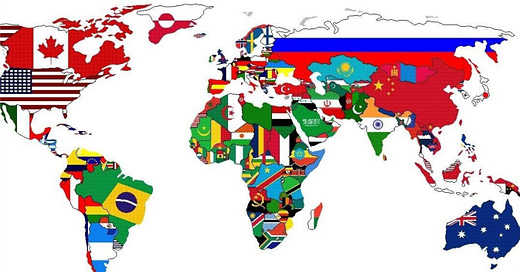EM Fund Stock Picks & Country Commentaries (May 18 2025)
China's domestic focused stocks, Vietnam's Resolution 68, India's economic momentum, all about umbrella funds, opportunities from domestic reforms in EM/FMs, more tariffs/AI research, etc.
As noted in recent posts, its seems like funds are now pushing investing in the UK or Europe. However, we noted earlier this month:
💻 Tether CEO Paolo Ardoino: 'Many' European Banks Will 'Blow Up' In The Next Few Years (Zerohedge) 🗃️
🎬 Tether CEO Paolo Ardoino: Banks will blow up in the next years (Less Noise More Signal) 48:09 Minutes (May 2025)
In addition, Alex Krainer (we noted his The coming collapse of Britain Substack piece some months ago which made a lengthy case for why Ukraine’s recent debt default nearly brought down and eventually will bring down the UK) has just written about a recent Reuters piece that might make investors even more cautious about Europe:
📰 ECB presses banks on dollar funding over Trump concerns (Reuters) 🗃️ / 💻 Fear of Trump grips the Eurozone (I-System TrendCompass) 🗃️
According to an article published yesterday by Reuters, the supervisors at the European Central Bank are worried about Eurozone banks’ exposure to US dollars and access to dollar liquidity in conditions of stress. Citing three people “familiar with the discussions,” Reuters reported that ECB officials are concerned that under the Trump administration, Eurozone banks’ access to US dollars could be cut.
The Fed has repeatedly bailed out European banking system: during the 2008 Financial Crisis, it provided a $110 billion swap line for the ECB; during the 2011 Euro crisis, it backstopped Eurozone banks with an unlimited swap line, and during the Covid pandemic it stepped up again with a $159 billion swap line. But if the Fed’s policy changes, the next crisis could be brutal. This could come to pass if, for example, US money markets curtail funding for Eurozone banks (as they did in 2008 and 2011)
I should point out that around the 28:05 minute mark in the latest All-In Podcast, venture capitalist Chamath Palihapitiya observed that there is no better place in the world right now to put capital in than the UAE and Saudi Arabia (note that our Middle East index has about 15 UAE stocks and 25 Saudi stocks so far…). And yet funds plus the corporate media seem to be pushing the UK and Europe…
Its also worth noting that at the 39:25 minute mark in the podcast, Chamath made the interesting observation that “tariffs have the potential to be the onramp to our version of Belt and Road…” and its started with “a real bang in the Middle East…” - observations you won’t hear on the corporate media…
As of the middle of May, a few new April fund updates have dropped (our continuously updated post containing all funds is here) and we have updated the international funds section (including many Q1 updates, etc.) plus there is plenty of new research starting with some non EM pieces:
🔬🇬🇧 Another piece pushing Europe/UK: UK equities: Is it time for a long overdue re-evaluation? (Janus Henderson Investors) - Amidst global uncertainties, UK equities are showing resilience, supported by the potential for better-than-expected UK economic growth.
🔬🌐 Trump’s move to slash U.S. drug prices creates uncertainty for pharma stocks (Janus Henderson Investors) - Research Analyst Luyi Guo discusses the potential impact of President Trump’s “most favored nation” drug pricing policy on biopharma companies and how investors should view the healthcare sector in this period of uncertainty.
🎥🌐 Notes on the end of a theme... (Platinum Investments) 0:56 Minutes - While everyone has been focused on tariffs we may have missed an earlier lesson from the markets. Markets often run on themes – until that theme runs out of steam. In this video, Douglas Isles reflects on what we can learn from the quiet end of the Magnificent Seven narrative.
New Asia Fund Documents & Research
⏰🎙️🌏 APAC Financial Markets Spotlight (FTSE Russell) - US/EMEA Timezone - May 22 2025, 9:00pm - Duration: 45 mins
Join APAC financial market specialists from FTSE Russell’s Global Investment Research team to hear analysis and commentary on the macro backdrop, market drivers, and trends shaping the APAC financial market. You will gain insights into their implications for fixed income, equity, and currency asset classes, as well as individual geographies within this diverse region.
What’s important to watch in APAC now?
Inflation and China's slowdown were two key macro themes in 2024. Since the second half of 2024, economies like New Zealand, the Philippines, Korea, and China have eased their monetary policies the most, primarily due to slowing inflation or domestic demand. In 2025, spillovers from China's slowing demand could continue to dominate the outlook for APAC markets. US trade policies have introduced further uncertainty and downside risks to the growth outlook of most APAC markets. Equity markets plunged by more than 10% across most APAC countries in the first half of April amid escalating trade tensions but rebounded afterward. Many APAC central banks have eased further YTD, and uncertainty around global trade has led to a more dovish tone from central banks. As a result, the yield curve has steepened further in many APAC sovereign bond markets.
🔬🇨🇳 There is a good graphic asking/answering "Can US easily substitute made-in-China products?" in this piece: U.S. and China: Balancing the Decoupling (Amundi) - Key takeaways
Beijing’s approach to the trade war has shifted dramatically; where it once favoured restraint and dialogue in Trump’s first term, it now responds with decisive retaliation.
Washington’s drumbeat of ‘strategic decoupling’ has strained trust, leading Beijing to adopt a more guarded and hesitant stance toward engagement, lowering the odds of meaningful negotiation.
Facing multiple contingencies, Beijing will likely lean towards an all-weather strategy: calibrating domestic economic buffers, expanding Global South partnerships, and selectively engaging with U.S. allies—while deprioritizing deals with Washington.


